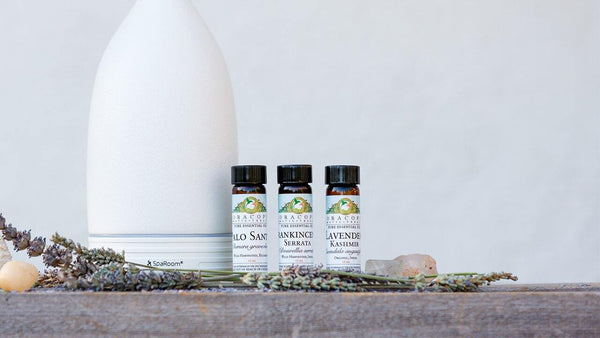COMMUNITY IMMUNITY: THE IMMUNE ENHANCING EFFECTS OF DIFFUSERS
By David Crow, L.Ac.
Essential oil-containing aromatic plants have been used for anti-infectious purposes for millennia. The unpleasant odors of sewage, rotting garbage, sick people, and environmental pollution reveal the presence of proliferating microbial toxins.
Without knowing the details of what pathogenic agents were present, people have always known that where there were bad vapors, diseases lurked. Throughout history, aromatic plants and their essential oils have been the primary antidote for these evil spirits.
Since the 1800s, scientific research has compiled a substantial body of evidence demonstrating that essential oils have powerful antimicrobial effects against a broad range of bacterial, viral, and fungal pathogens. As the disturbances of the Kali Yuga increase around us, it is wise to consider how these healing plants can be used as our allies, not only to prevent contagion and enhance personal immunity by purifying the atmosphere around us, but to remove the causes of illness within communities as well.
One of the recent discoveries of aromatic research is that the antimicrobial effects of essential oils are most potent not when the oil is used in liquid form, as when applying tea tree to a fungal infection, but when pathogens are exposed to the vapors of the oils. This means that the most effective way of utilizing essential oils for reducing atmospheric contagion, neutralizing air-borne illnesses and enhancing immunity is through the use of aromatic diffusers, ionizers, and nebulizers. It has also been found that it is not necessary to have a high concentration of oil in the atmosphere for it to be effective; only a minimum amount of oil dispersed from a diffuser is necessary for optimum biological and immunological effects.
Although there are many aromatic diffusers on the market, from simple candle burners to complex ultrasonic devices, atmospheric dispersion of aromatic botanical oils is nothing new. A traditional fire puja in Rajasthan filling the temple with aromatic offerings; precious sandalwood and agarwood incense moving like coiling dragons through monastery meditation halls; Egyptian ceremonies burning copious amounts of desert resins and exotic spices; Tibetan monks throwing juniper branches onto coals while chanting; an Arab family welcoming an honored guest with a smoking censer of their purest frankincense: these are all ways that cultures have practiced spiritual hygiene and community immunity throughout the ages.
In their native habitats, plants grow in communities. They must survive exposed to the natural elements, must compete with other plants, and must live in the midst of complex microbial and insect communities. Essential oils are part of a plant's immune system, created by its evolutionary intelligence primarily for repelling pathogens. By harvesting and distilling their oils, we bring the immunological power of the plant communities into our communities.
Just as an individual plant cannot thrive in a poor environment, no individual person can maintain their health if the community they live in is unhealthy. Whether it is the threat of serious epidemics such as avian flu, allergic reactions caused by genetically engineered food, antibiotic resistant bacterial infections, chemical sensitivities from an increasingly toxic environment, or just the common cold spread through schools and the workplace, one does not have to look far to see this basic truth.
A forest is a perfect example of community immunity. In conifers such as pine, spruce, and fir, the primary agents of the tree's defense are monoterpenes, aromatic molecules such as pinene, which give pines their characteristic fragrance. These molecules have several important physiological functions, including repelling insects and microbial pathogens and healing wounds to branches and bark.
Because trees and humans are so closely related biologically, it is not surprising to discover that the essential oils produced by a tree's immune system are directly beneficial for our immunity. When we diffuse conifer oils into our homes, we are not just bringing the beautiful fragrance of the forest indoors: we are also surrounding ourselves with a cloud of disease-fighting molecules created by the trees immunological intelligence.
A garden is another kind of plant community. When the soil is healthy and rich in nutrients produced by healthy microbial ecologies, the plants have vibrant flavors, colors and fragrances, indicating the presence of vitality and life force. Some of the most powerful antibacterial and antiviral essential oils come from this community: rosemary, sage, thyme, oregano, lemon balm, and lavender. A well-known example of this type of community immunity is the Hindu practice of growing of tulsi, holy basil, in courtyards of homes for its health-enhancing and insect-repelling powers; in other parts of the world aromatic plants such as basils and marigolds planted in gardens have been found to be highly effective for repelling mosquitoes from neighborhoods.
Deserts have their own communities of long-lived species, growing slowly under the harsh sun. In this community we find some of the most famous of the sacred scents used for prayer and meditation from time immemorial: frankincense, junipers, sages. From our own backyard in the dry California coastal mountains, we find the white sage, now globally renowned as part of Native American ceremonies, containing its own potent camphorous antimicrobial oils.
Jungles are intensely dynamic communities, filled with a multitude of diverse aromatic medicines. Here we find common spices like cinnamon, and more unusual species like ravensare and niaouli, which have unique antimicobial properties.
In the fields we find yet more fragrant plants with oils that destroy pathogens, such as lemongrass, palmarosa, citronella, and angelicas.
Nature has provided us with a rich and diverse palette of aromatic healing treasures to choose from. By filling our gardens and cities with aromatic plants, by using their flavors in our diet, and by diffusing the oils they produce into our workplace and homes, we are strengthened and protected by the essence of their immunological intelligence. We can create not just good health at the individual level, but community immunity as well.
David Crow, L.Ac is the founder and owner of Floracopeia, our supplier of organic and wild harvested essential oils and plant essences.


